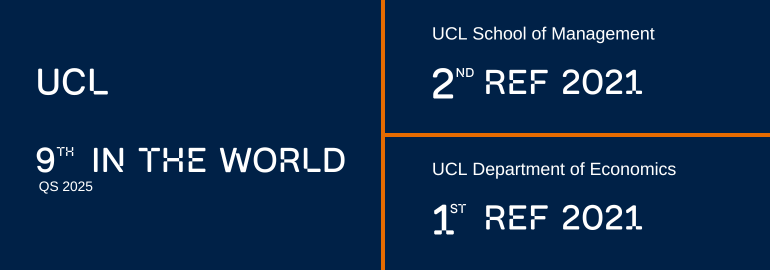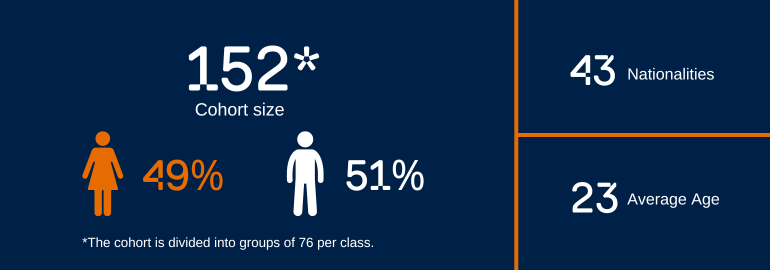Overview
Start date: September 2026.
Duration: 12 months (full-time only).
Fees for September 2026 intake: Home students: £48,250, Overseas: £48,250. Scholarships available.
Application deadline: Open on 20th October 2025 and close on 26th June 2026 at 5pm UK time for applicants who require a visa; and on 28th August 2026 for those who do not.
Entry: A quantitative undergraduate degree at 2:1 Honours (or equivalent) from a recognised university. International students, please note that UCL’s English language requirement for this programme is a ‘Level 2’ - further details regarding this can be found at the UCL English Language Requirements page.
Location: This programme is delivered in person at our Canary Wharf campus.
Important updates: Please note that the MSc Finance programme was redeveloped for 2025 entry. Please take time to review the page in its entirety as well as other finance postgraduate offerings at UCL School of Management, such as the MSc Finance with Data Science.
Programme
The MSc Finance programme offers world-class generalist training in finance. It provides you with a deep understanding of finance principles, financial practices, and analytical techniques. It combines theory and practice in a variety of finance-related topics, giving you a solid financial foundation and equipping you with the skills required to succeed as a finance professional.
This full-time programme is delivered by UCL School of Management and UCL’s Department of Economics.
Organisations seek talent who can bring core knowledge and critical thinking from the outset, and the MSc Finance programme is designed to equip ambitious students with the knowledge and decision-making skills to work for leading financial firms around the world.
The MSc Finance programme curriculum is closely aligned with the CFA® curriculum and covers most of the topics included in CFA® Level 1 and Level 2. Although our programme is not designed, per se, as specific preparation for the CFA® exam, it focuses on the underlying scientific foundations and extends beyond.
Programme structure
You will study four core modules in Term 1, providing a robust quantitative underpinning in key areas of finance. In Term 2, a further two core modules are studied, again reflecting a quantitative thrust. An optional module portfolio is offered, with four optional modules which can be undertaken in Term 2 and/or Term 3. The optional modules enable you to develop your interests in specialist areas and begin to mark out your career path.
Additionally, in Term 3 and during the summer, you will work on a concrete finance research project (such as a company valuation or the in-depth assessment of an investment strategy) supported by specific briefing and follow-up sessions.
The optional modules listed are subject to change each year and are indicative only. For questions about optional modules, please contact us at: mgmt-finance@ucl.ac.uk.
Modules
Programme for Students Starting Year 1 in September 2026
| Term 1 | Term 2 | Term 3 and over the summer period |
|---|---|---|
|
Compulsory Fixed Income Corporate Issuers and Equity Valuation Financial Statement Analysis Quantitative Methods |
Compulsory Derivatives Portfolio Management Optional (Group A) Valuation Hedge Fund Strategies Behavioural Finance (Group C) Influence and Negotiations Data Visualisation Retail and Consumer Entrepreneurship Leading High Performance Teams Building Sustainable Ventures Artificial Intelligence for Business |
Compulsory Finance Research Project Optional (Group B) Further Quantitative Methods International Macroeconomics and Finance |
You can choose a minimum of one and a maximum of three optional modules from Group A; a minimum of one and a maximum of two optional modules from Group B; and a maximum of one optional module from Group C.
Teaching Methods and Typical Contact Hours
The programme is delivered through a combination of lectures and workshop activities. Assessment is through written examinations (in-person), individual/group coursework, and a combination of a written report and a viva for the research project.
Each taught module in Terms 1 and 2 is delivered over 10 weeks, with 3 contact hours per week comprising lecture content and interactive components. Optional modules in Term 3 are delivered intensively with 10 x 3-hour sessions over a period of 5 weeks.
In addition, students spend approximately 7-12 hours a week for each module on assessment and independent study to further develop their skills and knowledge.
The total number of weekly hours will vary according to the module and the weekly activities being undertaken.
Core and optional module lectures, and any workshops, normally take place on weekdays between 08:00 – 19.30 hours but some events such as careers and networking opportunities may be scheduled for evenings and weekends.

How is this Programme Unique?
This programme draws upon the combined strengths of two highly rated departments: UCL School of Management and UCL’s Department of Economics. The knowledge and expertise of UCL’s academic staff combine to provide a repository for students to draw upon as they identify and respond to challenges and issues in real-world scenarios.
The programme offers knowledge, understanding and skills in a range of areas critical to the effective functioning of current and developing finance-related applications. These include asset pricing, derivatives, valuation, risk, analytics, modelling, and portfolio management. The programme captures most of the topics included in the CFA® curriculum for Levels 1 and 2.
Upon graduation, you will have acquired a set of analytical skills, qualitative insights, and an ability to work flexibly, creatively and internationally in a range of finance-related areas, including asset managers, investment banks, and management consulting firms.
As an MSc Finance student, you will benefit from a bespoke Careers and Employer Engagement programme and a dedicated careers team who will help you present yourself to leading graduate employers with confidence.
Being based at our Canary Wharf campus at One Canada Square in Canary Wharf, London’s financial hub, offers you a myriad of opportunities to network with industry professionals. The School works closely with global companies and innovative start-ups at the cutting edge of management and associated finance-related practice.
Why choose UCL?
UCL School of Management and the Department of Economics
The programme is delivered jointly by the School of Management and the Department of Economics.
UCL School of Management offers innovative programmes to prepare people for leadership roles in the next generation of innovation-intensive organisations. The School works closely with global companies and start-ups at the cutting edge of management and associated finance-related practice.
The research performed in the UCL School of Management was rated as “world-leading” and “internationally excellent” in the 2021 Research Excellent Framework (REF), placing us second in the UK for business and management.
The UCL Department of Economics has an outstanding international reputation in key areas of current research. The Department ranked top in the UK for research environment and outputs in the field of Economics and Econometrics in the 2021 REF.
The Research Excellence Framework 2021 (REF) has placed UCL Economics first for 4* world-leading research outputs and research environments, with scores of 72% and 100% respectively. The Department also placed third in its overall ranking with 65% of all indicators ranked as 4*.

Applications
If you are passionate about finance and want to push yourself in your quest to forge a career in the financial sector, or want to develop your knowledge of core finance principles, this programme will be instrumental in achieving your goals.
As a MSc Finance student, you are expected to have basic knowledge in statistics, mathematics and a passion for finance. You should be motivated to take your knowledge to the next level.
Our students come from different academic backgrounds including economics, accounting, finance, statistics, engineering, or mathematics. Degrees from other disciplines may be considered if the applicant can demonstrate sufficient quantitative skills.
Student Profile

Meet us at an Event
If you’re considering applying to one of our programmes and would like to discuss your eligibility, you can meet a member of the Student Recruitment Team at an event in a city near you.
Click below for upcoming events, booking 1:1 appointments with the Student Recruitment Team, and how you can connect with us.
MSc Finance Virtual Open Day 2025
Launch your finance career with world-class training. Join us for an exclusive virtual open day exploring the UCL School of Management’s MSc Finance programme – a rigorous, generalist degree combining quantitative finance foundations with practical applications across corporate finance, asset pricing, derivatives, and investment banking.
In this virtual open day, learn:
- Strong quantitative and theoretical foundations in finance principles
- Coverage of topics aligned with CFA® curriculum (Levels 1 & 2)
- Specialist modules in areas including behavioural finance, fintech, and portfolio management
- Industry partnerships and employer engagement
- Graduate outcomes in leading global financial centres
Delivered jointly by the School of Management and Department of Economics, this programme equips you with the knowledge and decision-making skills to succeed in New York, London, Tokyo, Hong Kong, and beyond.
Questions answered in this session:
- What specialisations can you pursue?
- How does the research project work?
- What’s the career support like?
- Entry requirements and application timeline
Application Process
Applications for the 2026/27 cycle open on 20th October 2025 and close on 26th June 2026 at 5pm UK time for applicants who require a visa; and on 28th August 2026 for those who do not. Applications must be completed and submitted by the deadline, or they will not be considered. Programmes are competitive, so students are advised to apply as early as possible.
Programme Dates
This programme is full-time for one year, starting in late September 2026 and ending in late September 2027. All students must be in London by the first day of the first term in September. Students are expected to remain in London for the duration of the programme (including the summer months), with the only exception the Christmas and Easter closure periods.
Application process
Students are advised to apply as early as possible due to the competition for places. A staged admissions process is in place for this programme. This means that when you apply, your application will be considered with all others that have been submitted before the deadline. This enables us to ensure that all applications are considered fairly and equally.
Entry Requirements
We look for students with drive, intelligence, passion, and the right aptitude. To ensure we enrol students who meet those four criteria, we use the following methods to assess applications.
Academic Entry Requirements
• A quantitative undergraduate degree at 2:1 Honours (or equivalent) from a recognised university. International students can find their international equivalency on the UCL international students website.
• Degrees in economics, finance, mathematics, accounting, engineering, statistics or any combination thereof are preferred. Degrees in related fields are also considered if the applicant can demonstrate sufficient quantitative skills.
GMAT/GRE
- GMAT/GRE are not required for MSc Finance.
- However, a strong GRE quantitative (162+) or overall GMAT or GMAT Focus (at least 80th percentile) scores add weight to the application.
English Language Requirement
- The English language level for this programme is Level 2.
- Further information can be found on our English language requirements page.
CV
Applicants are required to submit a CV. Please make sure to provide all relevant and accurate information (exact degree title, beginning and end dates, location for professional experience, etc.)
Personal Statement
Submitting a personal statement is not required, but it can be used if you wish to communicate specific information to the admission committee.
Interview
Applicants who meet the entry requirements will be reviewed. Those considered eligible for the next stage will be invited to an online video interview, with the invitation sent by email from Kira Talent. Applicants invited to interview will have a window of 7 calendar days from receipt of the email to complete the interview. Failure to complete an interview within this window will lead to an unsuccessful application. Applicants should regularly check the inbox and junk mail boxes for the email address used to apply.
Not sure which programme is for you?
Choosing the right programme is essential for a successful application and to ensure you maximise your time with us. We also offer an MSc Finance with Data Science programme, which is a unique programme that combines the scientific foundations of finance with the theory and practice of rigorous financial data analysis. The key differences are summarised in the table below.
|
|
MSc Finance |
MSc Finance with Data Science |
|---|---|---|
| Typical applicant | Aspiring finance professional with broad interests. A typical first job title will be Financial Analyst and many graduates will aspire to taking the full sequence of CFA certification rapidly. |
Aspiring finance professional with a passion for data and the will to develop cutting-edge data science and econometric skills. |
| Balance and focus | A generalist finance degree that balances scientific foundations and the practice of finance. |
A specialist finance degree that aims at providing a very high level of data science literacy. |
| Entry requirements | 2:1 (first preferred) | 2:1 (first preferred) |
| Quantitative skills | Excellent quantitative skills | Outstanding quantitative skills |
| GRE/GMAT | Not required, but strong GRE quantitative (162+) or overall GMAT or GMAT Focus (at least 80th percentile) scores add weight to the application. |
Not required, but outstanding GRE quantitative score (165+) adds weight to the application. |
| Key features | Outstanding coverage of CFA topics (95% of CFA Level 1 and 80% of CFA level 2). |
Almost all modules involve dealing with real-world financial data (from sources such as Bloomberg terminals, Refinitiv, etc.) |
| Target jobs | Graduates will typically place in a financial company, but will also have opportunities at finance departments of non-financial companies. In both cases, roles are likely to be more of a generalist nature with less intense data exposure. Typical examples will be Financial Analyst or corporate analyst at commercial or investment banks, but graduates will also have ample opportunities at mutual funds, hedge funds, and other financial firms. |
Graduates will typically place in a financial company, in roles that are more quantitative than MSc Finance graduates, and with a large expected exposure to computer and data scientists. Some examples: Credit Analyst (e.g., in a credit rating agency), Portfolio analyst (pathway to become a Portfolio Manager in any asset management company), Quantitative Analyst (e.g., in a hedge fund), Risk Analyst (e.g., in a clearing house), Investment Analyst (in any finance boutique), or even Financial Engineer (e.g., in an investment bank to design structured products). |
| Affiliations | UCL, through this programme, is a CFA® affiliated university, entitling students to apply for scholarships to reduce exam and registration fees. |
UCL, through this programme, is a University Partner for the CQF Institute, which provides networking opportunities and career resources for those pursuing a career in quantitative finance. |
Which Programme is Right for you?
Watch our MSc Finance and MSc Finance with Data Science animated explainer video to see the differences between the two unique programmes and help you decide which is the right one for you.
Tuition fees and Scholarships
Tuition Fees
The 2026-27 fees will be published in Autumn 2025. Learn more about tuition fees.
Scholarships and Funding
Scholarships will be awarded to candidates in one of the following four categories:
- Women in Finance Scholarship – Scholarships will be given to outstanding female candidates who apply to the programme.
- Global Finance Scholarship - Scholarships will be given to outstanding candidates applying to study from a Latin American or African country.
- The Excellence Scholarship – Scholarships will be given to outstanding candidates who submit an excellent application, demonstrating academic merit, strong professional or community experience, leadership potential and a clear career plan.
All applicants who apply to the programme for September 2026 entry will be automatically considered for the above scholarships, and our admissions teams will be in touch if you have been chosen.
- The Impact Scholarship – Scholarships will be given to outstanding offer-holders from lower-income backgrounds.
This scholarship will have a separate application process. All offer-holders will be contacted in March 2026 with details of how to apply. Later applicants to the programme are unlikely to be considered in time for this scholarship.
Fulbright Commission Award
The Fulbright Commission Award is available for a US graduate student or those with equivalent experience in a relevant field to study the Business Analytics MSc. Please note this is only available to citizens of the United States of America. Further details on the Fulbright website and the Fulbright US Student Programme website.
Additional Costs
This programme does not have any compulsory additional costs outside of purchasing books or stationery, printing or photocopying.
This programme may include opportunities for students to undertake optional international study trips. The costs of such trips are usually covered by students, although some elements may be subsidised or grants available depending on the destination, organisational and support responsibilities. On average, costs would be around £1,500 to £2,500 depending on the trip location, personal flight preferences and spending habits as well as the prevailing exchange rates.
For more information on additional costs for prospective students, please go to our estimated cost of essential expenditure at Accommodation and living costs.
Careers
The Careers service offered to MSc Finance students at UCL is designed to help you build a strong foundation for early success in your career. Through a combination of tailored support, employer engagement, and alumni connections, you’ll graduate equipped with the skills and confidence to thrive in your chosen field, regardless of your background, nationality, or prior experience.
For further information on the Careers provision for the UCL School of Management, please see our Careers page.
Dedicated School of Management Careers Support
As an MSc Finance student, you’ll benefit from bespoke Careers support delivered by a specialist careers team. This includes:
- One-to-one career coaching with professionally-certified, industry-focused Careers Consultants
- Access to our global alumni network, who are keen to offer advice and guidance
- Online resources which can be accessed on demand to support your career journey
- A Careers and Professional Development (CPD) Programme for PGT students.
At the centre of the CPD programme is a series of weekly in-person and online sessions in the Autumn and Spring terms spanning two streams of sector focus:
- Finance, Accounting and Banking
- Management, Analytics and Business.
By taking part in these career streams, you will participate in:
- Recruitment Readiness workshops to prepare for the graduate recruitment cycle.
- Industry Insights events to connect with alumni and recruiters in the School of Management.
- Skills Shaping sessions to develop the transferable and technical skills employers value.
UCL Central Careers Resources
In addition to the School of Management’s tailored support, you’ll also have access to UCL Careers’ extensive resources. Each year, hundreds of employers participate in UCL Careers events, including:
- Careers fairs and employer presentations
- Sector-themed weeks with networking opportunities and expert panels
Where our Graduates Work
Our graduates pursue global careers across a wide range of roles, sectors, and geographies. Popular sectors include Banking and Finance, Consulting, Marketing, Technology, and Data & Analytics. Some of the top job titles among our recent graduates include Finance and Investment Analysts and Advisers, Brokers and Chartered and Certified Accountants.
Some of the top companies our graduates went on to secure roles in include Aegon, Antaurus Capital Management, Bank of China, BDO LLP, Btomorrow Ventures and Deutsche Bank and many more.
For more information and statistics on where our graduates work, you can view the most recent data available from the UCL Graduate Outcomes Survey.

Contact
For further information regarding the MSc Finance programme, please contact the Postgraduate Team.
For further queries regarding admissions, please see the UCL Postgraduate Admissions Webpage.
Canary Wharf Campus

The UCL School of Management is located on Levels 38, 49, and 50, One Canada Square, Canary Wharf, London’s global business district. The above photo is one of the many exciting views from this prestigious location. The quality of our lecture theatres at Canary Wharf is outstanding and has been described by guests as some of the best in the UK. Canary Wharf is a dynamic, modern district of London, with superb train connections to other parts of London.
The district is particularly known for financial services, and the Level 39 incubator, specialising in cyber security, fintech and retail tech, has 1,250 occupants spread across adjacent floors of the building. MSc Finance students can connect and collaborate with some of the businesses.
In addition, all facilities at our historic Bloomsbury campus, including libraries and a dedicated student centre, are available to our students. We have also recently opened a further campus, UCL East, located at the former Olympic Park in Stratford.
London was recently identified as the no.1 city in the world in which to study by QS Top Universities on criteria such as student mix, quality of living, opportunities, and affordability.
Want to experience student life from our campus in the clouds?
Grab your spot on one of our upcoming Canary Wharf Campus Tours
We recommend you register early as spaces are limited.

Other Programmes of Interest
UCL and the UCL School of Management offer a range of finance and data science-related programmes, while this programme is unique in combining the two, please note other programmes that may be of interest to you.
Programmes delivered by the UCL School of Management
Video Library
Register for more information
FAQs
You may apply now for a place on a programme without a current English test as long as you send your qualification as soon as you receive it. If you are offered a place, it will be conditional on you providing evidence of meeting UCL’s English Language Requirements before the start of the programme.